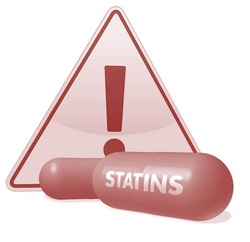
google image from: www.regenexx.com
Statins are drugs given to lower cholesterol.
This post is copied from the The Mayo Clinic website http://www.mayoclinic.com/health/statins/CL00010
Weighing the risks and benefits of statins When thinking about whether you should take statins for high cholesterol, ask yourself these questions:
Potentially serious side effects
Keep in mind that when you begin to take a statin, you'll most likely be on it for the rest of your life. Side effects are often minor, but if you experience them, you may want to talk to your doctor about decreasing your dose or trying a different statin. Don't stop taking a statin without talking to your doctor first.
This post is copied from the The Mayo Clinic website http://www.mayoclinic.com/health/statins/CL00010
Weighing the risks and benefits of statins When thinking about whether you should take statins for high cholesterol, ask yourself these questions:
- Do I have other risk factors for cardiovascular disease?
- Am I willing and able to make lifestyle changes to improve my health?
- Am I concerned about taking a pill every day, perhaps for the rest of my life?
- Am I concerned about statins' side effects or interactions with other drugs?
Potentially serious side effects
- Liver damage. Occasionally, statin use causes an increase in liver enzymes. If the increase is only mild, you can continue to take the drug. Rarely, if the increase is severe, you may need to stop taking it. Certain other cholesterol-lowering drugs, such as gemfibrozil (Lopid) and niacin (Niacor, Niaspan), increase the risk of liver problems even more in people who take statins.
Although liver problems are rare, your doctor will likely order a liver enzyme test before or shortly after you begin to take a statin. You shouldn't need any additional liver enzyme tests unless you begin to have signs or symptoms of trouble with your liver. Contact your doctor immediately if you have unusual fatigue or weakness, loss of appetite, pain in your upper abdomen, dark-colored urine, or yellowing of your skin or eyes.
- Muscle problems. Statins may cause muscle pain and tenderness (statin myopathy). The higher the dose of statin you take, the more likely you are to have muscle pains. In severe cases, muscle cells can break down (rhabdomyolysis- a rare condition that causes muscle cells to break down.) and release a protein called myoglobin into the bloodstream. Myoglobin can damage your kidneys. Certain drugs when taken with statins can increase the risk of rhabdomyolysis. These include gemfibrozil (Lopid), erythromycin (Erythrocin), antifungal medications, nefazodone, cyclosporine (Restasis, Sandimmune) and niacin (Niacor, Niaspan). If you take statins and have new muscle aching or tenderness, check with your doctor.
- Increased blood sugar or type 2 diabetes. It's possible your blood sugar (blood glucose) level may increase when you take a statin, which may lead to developing type 2 diabetes. The risk is small, but important enough that the Food and Drug Administration (FDA) requires a warning on statin labels regarding blood glucose levels and diabetes. Despite this possible connection between increased blood sugar and statin use, it's still safe for most people with high cholesterol, including diabetics, to take statins. Talk to your doctor if you have concerns.
- Neurological side effects. Some researchers have studied whether statins could be linked to memory loss or amyotrophic lateral sclerosis (ALS), also known as Lou Gehrig's disease. While there's little evidence that statins can cause ALS, the FDA says some people who take statins have developed memory loss or confusion while taking statins. These side effects reverse once you stop taking the medication. Talk to your doctor if you experience memory loss or confusion. Don't stop taking your statin medication before talking to your doctor.
Keep in mind that when you begin to take a statin, you'll most likely be on it for the rest of your life. Side effects are often minor, but if you experience them, you may want to talk to your doctor about decreasing your dose or trying a different statin. Don't stop taking a statin without talking to your doctor first.
 RSS Feed
RSS Feed